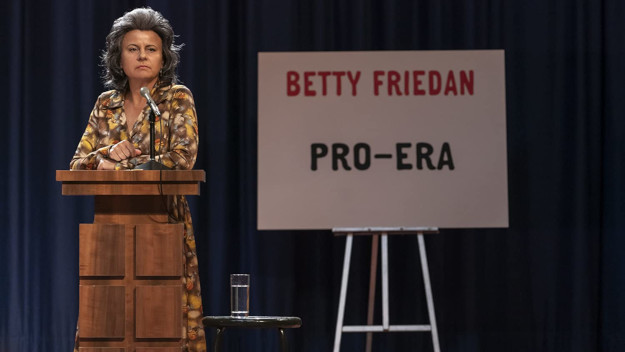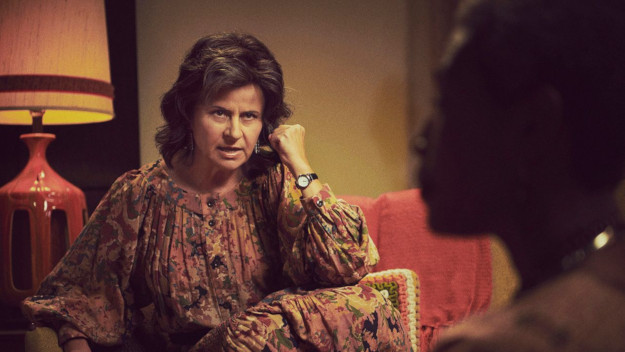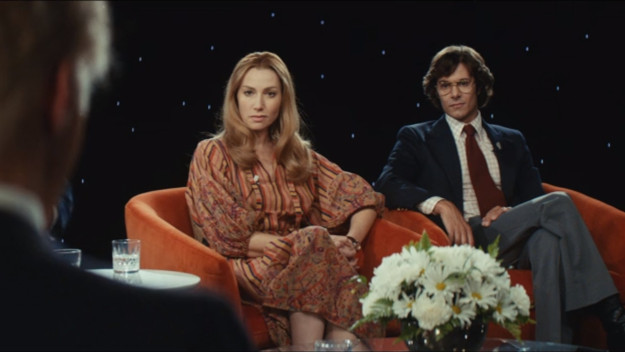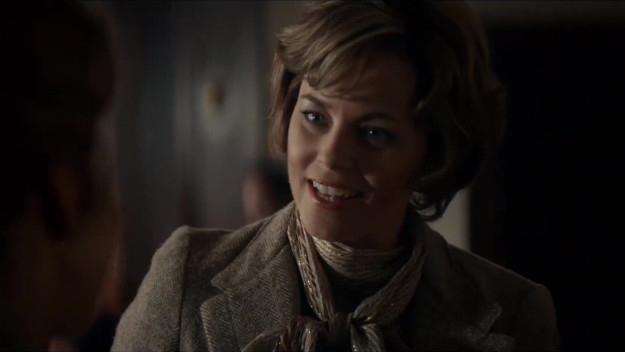
I know that the show points out that it made creative or dramatic changes, but they shouldn’t toss history out the window.
Edit #1 (5/16/2020): While doing research for Part 3, I found a confirmed link between the KKK and the Stop ERA movement. This article has been updated to reflect that there was no confirmation at this point in the timeline.
Edit #2 (5/17/2020): Ari Graynor’s last name was misspelled and a part of a sentence in the discussion of Episode 6 had to be reworked for flow. Fixed!
Edit #3 (5/29/2020): Text altered in the transition to Part 3.
Before we take a look at the second three episodes of Mrs. America, it’s important to note that you might be lost if you haven’t read Part 1 first. Be sure to check that out!
And of course, this article will cover virtually everything, so click away and come back later if you care about spoilers.
Okay, let’s get to it!
Episode 4 – The Great Debate.

Even though I have issues with this miniseries, I will say that Tracey Ullman is quite fun to watch.
“Betty” is a rather significant episode in this show because it marks the first time where the two major plot threads are tied together, and it’s done in a rather interesting way. The story largely focuses on a 1973 debate between Betty Friedan and Phyllis Schlafly, but bits and pieces of other massive national events are thrown in the background to fill a little bit of time.
Much to my surprise, there are even more historical issues in this one.
The story opens with a time jump to 1973, and the show spends a little bit of time recapping what is going on in the world. On one hand, Roe v. Wade was just decided. On the other, Richard Nixon won a second term and is currently embroiled in the Watergate scandal. In the middle of all of that, Betty and Gloria are engaging in some information warfare.
After some deliberation, the feminists of the story decide to run with Phyllis’ connections to the John Birch Society and possible association with the KKK, which could destroy her credibility. While I don’t know if Phyllis associated herself with the Klan at this point in time, the Bircher label is absolutely accurate, so I have to give credit to the writing team for finally addressing the topic.
Naturally, Alice and the rest of Phyllis’ Eagles are scared of being associated with two extremist groups, but Phyllis pays this little mind. As she prepares for the debate, Fred gives her a unique lesson that seems to play into modern politics. In an adversarial scene that may or may not have happened, he points out that facts are less important than getting under the opposition’s skin and provoking an emotional outburst.
Sure, the idea may not even be necessary when we consider the subject matter at hand, but it is an undeniably effective tactic in almost all cases. With that said, I seriously doubt that Phyllis had to resort to that when she could just rattle off any number of issues with the ERA.
The feminist side of the story splits its attention between Betty and Gloria, which works rather well by invoking a sense of contrast. Betty is trying to be a little bit normal, so she goes on a date with a Jewish man. Meanwhile, Gloria is forced to deal with a crude form of trolling by the readers and publishers of Screw, which reiterates the point that feelings are often more important than facts in a different way.
Both storylines converge at Illinois State University, but it’s important to remember that some of the pieces that are featured in the fictionalized version may have been taken from a broadcast of WJBC’s “Problems & Solutions” from earlier that day (Source/Archive). As the debate begins, Phyllis and Betty hold a fired-up discussion with a few jokes here and there, papering over the fact that Betty actually had laryngitis at the time. At certain points, Betty makes fair points about Phyllis’ attitude and the fact that women actually need to accept equal responsibilities in society. In response, Phyllis states that American women are actually a highly privileged class, and that feminists seem to be unhappy about everything.
Soon after that, Phyllis senses that she’s losing the crowd, so she throws the debate into the gutter. She launches into a conservative monologue about how women shouldn’t actually look to the government to solve all of their problems, pointing out that initiatives like the ERA won’t actually solve personal problems like your husband leaving you for a younger woman.
Okay, let’s stop right there. We don’t have any evidence that she ever said that. If she did, you’d think that it’d make the newspapers of the time, wouldn’t it?
Betty snaps out of anger, stating that Phyllis is a traitor to her sex and a witch who she’d like to burn at the stake, which draws gasps from the audience. Phyllis uses that statement in a post-debate interview as an excuse to smear ERA supporters as being off their rockers, but we should not forget that a portion of the real statement was actually cut out of the show.
Betty actually called Phyllis an Aunt Tom as well (Source/Archive).
The show lays it on even thicker after that. The end of the episode would have been a good time for a reflective moment, but Betty doesn’t do that. Instead, she chooses to blame how the debate will be perceived on the male press.
Look, I have my issues with the media, but that just seems like a hallmark of modern feminism, doesn’t it? If a woman ever says something that’s monumentally stupid, blame it on the men! After all, it’s not like women are actually mature enough to handle speech, right?
Episode 5 – Here We Go Again.

Writers who dramatize history should hew as closely as possible to reality. This show doesn’t really do that.
“Phyllis & Fred & Brenda & Marc” is another debate episode, but it draws on the theme of marriage instead of a standard debate about what it means to be a woman. Unfortunately, this one devolves into a laughable, propagandized affair rather quickly.
The story begins with a piece of “performance art” where a bunch of feminists state that marriage is a prison and wave around a bunch of floppy cocks.
Okay, I have to stop right there. Why does feminist rhetoric drive away men again? It’s an unsolvable mystery!
Anyway, Gloria, Franklin Thomas (Jay Ellis), Marc Feigen-Fasteau (Adam Brody), and Brenda Feigen-Fasteau (Ari Graynor) guffaw at this great piece of art that rivals Da Vinci, and we’re treated to the primary subplot. Brenda hits it off with a photographer by the name of Jules (Roberta Colindrez) and winds up having a lesbian affair. Marc takes this opportunity to turn into a fucking idiot and states that stepping out on one’s marriage for a woman is a feminist right of passage.
Look, I get that the 1970s was a different time, but I think that the creative team forgot that they’re making this for a modern audience. By putting these two couples side-by-side, they’re basically comparing their intentional statement that a conservative marriage is a prison with their unintentional statement that a “progressive” marriage is basically a shit heap where a man just has to accept the fact that his wife is going to cheat on him in the name of empowerment.
Why are marriage rates crashing again? It’s an unsolvable mystery!
Of course, Brenda keeps cheating on Marc and strains under the weight of him wanting to talk about their potentially imploding marriage… which seems like a rejection of the feminist idea that men should openly talk about their feelings.
As all of this comedy gold is happening, Bruce Schlafly (Brendan Cox) isn’t that keen on becoming a lawyer, so Phyllis tries to take the LSAT in his place. On top of that, she is alerted to the fact that her son, John (Ben Rosenfield), might be gay, but that doesn’t really figure into the story until after the debate.
Unfortunately, the Hollywoodized version of this debate seems to be stuffed with lies. In the version described on Hulu, the show deliberately mashes in selectively-edited quotes from Good Morning America in 1978 and makes Phyllis flubber around like an idiot. In segments that one can find on Youtube, the real Phyllis of time period appeared to emphasize freedom of choice and the fact that a lot of women have to work, but pointed out that most women like to put motherhood first.
Some people might dismiss that as tradcon-ish, but it does explain quite a bit.
To make matters worse, the Eagles actually put out a fact check that appears to show that the writers deliberately flipped the script. In the show, Phyllis makes up a legal case to justify her argument about child custody. In the real clips, Brenda Fasteau alleged that married women had to be sterilized in order to have their income count the same as a man in banks and department stores.
Of course, the public doesn’t have access to the full debate, so I encourage the Eagles (or anyone else, for that matter) to release it on Youtube and elsewhere. Until then, take what they say with a pinch of salt.
The episode ends with a heart-to-heart talk in which Phyllis tells John that being gay is like smoking cigarettes, which made me laugh my ass off. I get that the real Phyllis Schlafly was howlingly anti-gay, but the writers could have picked an analogy that wasn’t so unintentionally funny.
Episode 6 – LMAO.

What is this? An episode that is somewhat accurate?! No way!
“Jill” is a little bit more like “Shirley” than the previous two episodes, but with a startling difference. We only have to deal with a little bit of historical gobbledygook this time! Yay!
The story begins in 1975, but skips to 1976 later on. At this point in time, President Gerald Ford (Tom Barnett) is organizing a commemoration of International Women’s Year. Jill Ruckelshaus (Elizabeth Banks) is at the center of it all because she’s effectively the Republican Party’s point-woman for issues like the ERA.
Before we go any further, it’s important to point out that many people probably didn’t know about Jill before this episode, which should tell you something about her significance to the modern feminist movement.
We’re soon introduced to Jill’s husband, William (Josh Hamilton), who was the first Administrator of the EPA, an Acting Director of the FBI, and a Deputy U.S. Attorney General who resigned in the face of the Saturday Night Massacre. It’s also implied that they have tons of sex, which is absolutely laughable when one considers the anti-male propaganda that is parroted by modern feminists.
Anyway, Jill spends most of the episode lobbying Congress for help with her commission, but she has to deal with people like Rep. Wayne Hays (Curtis Shumaker). For those of you who aren’t in the know, the Democrat was implicated in a sex scandal where he put a mistress on salary in his office while divorcing his wife and marrying his secretary, so it makes sense that he’d be kind of piggy (Source/Archive).
Later on, we learn from Shirley Chisholm that several secretaries are alleging that congressmen were or are forcing sex on them in order to keep their jobs, which is absolutely awful and at least partially inspired by true events. For instance, we happen to know of a congressman named John Andrew Young. He was accused of that in 1976, and it gained traction in the papers of the time. While he did lose his seat in the 1978 primaries, his wife tragically committed suicide in July of 1977.
Of course, we don’t have a lot of evidence to back up the rest of the accusations, but such an epidemic isn’t all that implausible when one considers that the Office of Compliance pissed away $17 MILLION in taxpayer money on sexual harassment settlements between 1997 and 2017 (Source/Archive). Sure, some of those allegations might be false, but the sheer scale of this finding shows us that more than a few politicians are stupid and drunk on power.
Meanwhile, Phyllis has hit a snag. While she is attending law school, her Eagle Forum is running out of a subscriber base within conservative circles, so she’s wondering what to do about it. At first, she thinks about recruiting apathetic women, but she soon learns that a woman by the name of Lottie Beth Hobbs (Cindy Drummond) plagiarized her ERA talking points. For a wide variety of reasons, the southerner has a larger base of support from evangelicals than Phyllis does, so Phyllis proposes a merger and offers Lottie the Vice Presidency of the Eagle Forum.
Insert LOL-worthy lines about how women want roses, not rights here.
Later on, Phyllis and Jill meet at the National Press Club in Washington, D.C., and the fireworks start! Much like in Episode 4, their discussion starts off okay with a name drop of Donald Rumsfeld and a back-and-forth about Barry Goldwater, but it quickly turns into a mess. Apparently, Jill believes that a lot of what Phyllis says is just political theater, but she’s surprised to learn that Phyllis actually thinks that virtuous women don’t have to worry about sexual harassment.
Normally, I’d knock the writers because Phyllis actually said that in 1981, but it’s not completely implausible that she held that opinion before (Source/Archive). Like I said, she’s a moonbat.
After Jill registers her disgust with a parting shot about how men will be looking up Phyllis’ skirt, the storylines split once more. Phyllis spends some more time with Lottie, who states in no uncertain terms that abortionists and gay teachers should be burnt at the stake. After that, Phyllis goes to church because of her highly religious fear that her son, John, is a sinful pervert. These two segments are naturally quite disturbing and extremely plausible, especially when one considers that modern evangelicals are religious fundamentalists who have a thing for gay conversion therapy and Hell Houses. Yuck!
On the feminist side of the story, Jill is overjoyed to learn that her husband is on Gerald Ford’s shortlist for the Vice Presidency, but she soon learns that such power comes at a cost. William wants her to keep quiet out of the fear that a mouthy, ERA-supporting feminist might blow everything up, which is a fair concern when one thinks about the fact that the Vice Presidency is a national platform. They just have to secure the nomination and get past Carter.
Once Phyllis encourages John to make a fresh start out of town, we cut to the 1976 Republican National Convention. For some real life context, this convention marked the end of Ronald Reagan’s second presidential run, and it was the first time that he was taken incredibly seriously as a contender. Of course, the sudden presence of a vast conservative movement on the floor scares Ford away from William Ruckelshaus and toward Bob Dole, so Jill rallies everyone she can to save moderate-to-liberal positions.
Her efforts get her virtually nowhere.
In between it all, Phyllis scores a meeting with Ronald Reagan’s team. While she has to deal with arguably sexist jokes, she’s actually in the inner circle for the first time. And that’s where it ends.
That’s Part 2 of Mrs. America. If you in the mood to close things up, head on over to Part 3!
No Comments Yet